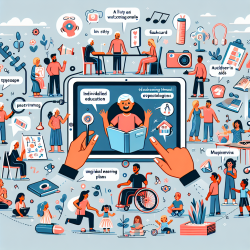As a practitioner at TinyEYE, it's essential to stay updated with the latest research to enhance your skills and provide the best services to your clients. One significant area of research is the use of voice synthesizers in augmentative and alternative communication (AAC) systems. The study titled "Intelligibilité et Appréciation des Synthèses Vocales en Français" by Trudeau, Chaput, Sutton, Chan, and Contardo offers valuable insights into the intelligibility and subjective ratings of French voice synthesizers. This blog post will explore how you can implement the outcomes of this research to improve your practice.
Understanding the Research
The study aimed to measure the intelligibility of seven voices (six French synthesized voices and one digitized natural voice) and to assess the subjective ratings that French speakers gave to these voices. The participants were divided into two groups based on their previous experience with voice output communication aids: 15 novices and 10 familiar users. They were asked to write down words produced by the various voices under two conditions: words alone and words at the end of a sentence. Additionally, participants provided subjective ratings for the voices they heard.
Key Findings
- Intelligibility: The study found that the degree of previous exposure to voice output communication aids did not affect the performance of the participants. Some voices were more intelligible than others, and the presence of a linguistic context significantly facilitated the recognition of words.
- Subjective Ratings: Participants showed preferences for certain voices, and a link between intelligibility and subjective ratings was observed. However, among voices with similar intelligibility levels, subjective preferences varied, emphasizing the importance of considering both types of variables when making a recommendation.
Practical Applications for TinyEYE Practitioners
Based on the research findings, here are some practical applications for TinyEYE practitioners:
- Choose the Right Voice Synthesizer: When selecting a voice synthesizer for your French-speaking clients, consider both the intelligibility and subjective ratings of the available options. This ensures that the chosen voice synthesizer is not only easy to understand but also preferred by the user.
- Utilize Linguistic Context: Incorporate sentences and phrases rather than isolated words when programming AAC devices. The presence of a linguistic context significantly improves the intelligibility of synthesized voices.
- Personalize Recommendations: Take into account the individual preferences and needs of your clients. Since subjective preferences can vary even among voices with similar intelligibility, it's crucial to involve the client in the selection process.
- Encourage Continuous Learning: Stay updated with the latest research and advancements in voice synthesizers. Encourage your colleagues to do the same to ensure that your practice is based on the most current and effective methods.
Conclusion
The research by Trudeau et al. provides valuable insights into the intelligibility and subjective ratings of French voice synthesizers. By implementing these findings, TinyEYE practitioners can enhance their practice and provide better services to their clients. To read the original research paper, please follow this link: Intelligibilité et Appréciation des Synthèses Vocales en Français.










